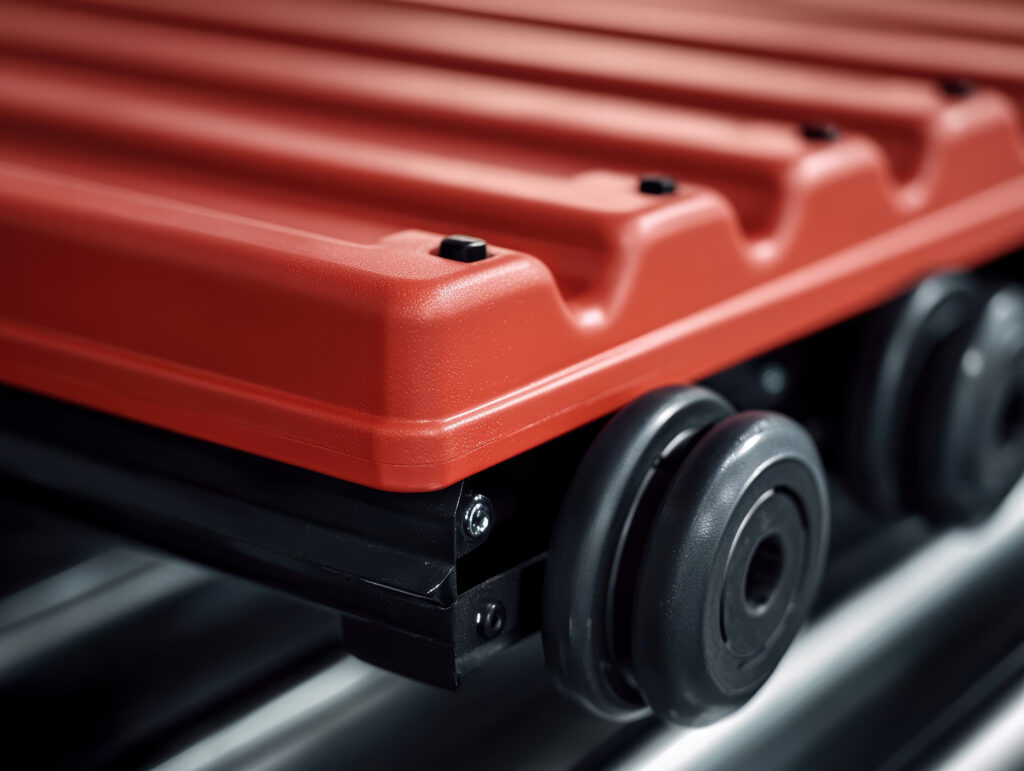Why Polyurethane is the Ideal Material for Wheels & Rollers
A forklift grinds to a halt halfway through lifting a heavy pallet. And it’s all because of a faulty roller. Not only does this unwelcome surprise delay production, but it also poses a safety risk. Whether it’s forklifts in warehouses or conveyor belts in manufacturing plants, the humble wheels and rollers are dutiful foot soldiers who keep operations running smoothly. Their quality is critical.
When it comes to selecting the right material for industrial wheels and rollers, polyurethane consistently rises to the top. It retains that lofty perch for its unmatched benefits, especially when compared to rubber and metal alternatives.
The Advantages of Polyurethane Wheels & Rollers
Polyurethane has emerged as a leader in industrial applications due to its distinct material properties.
1. Longevity That Saves Costs
Everyone appreciates industrial-grade durability – and polyurethane excels at standing up to intensive wear and tear. Unlike its rubber or metal counterparts, its ability to handle both high-friction environments and continuous use makes it a durable and cost-effective choice.
2. High Load-Bearing Capacity
Industrial settings often place tremendous weight on wheels and rollers. Polyurethane is known for its exceptional load-bearing capabilities, making it ideal for heavy-duty applications such as forklifts, conveyors, and even warehouse storage systems. Businesses can rely on it for supporting significant weight without losing functionality or shape.
3. Impressive Chemical Resistance
Industries like chemicals, food processing, or manufacturing often expose wheels and rollers to harsh chemicals, oils, or solvents. Polyurethane rollers and wheels hold up exceptionally well under these conditions, where other materials like rubber may degrade or swell.
4. A Quieter Alternative
Who wants to listen to grinding, heaving metal all day? Loud operations can lead to more than just workplace frustration. Noise reduction is crucial for compliance and fostering a better work environment. Polyurethane wheels outperform metal counterparts by significantly reducing noise while in motion, making them a favorite in noise-sensitive applications.
PSI offers solutions for making polyurethane a vital piece of your production puzzle.
Polyurethane vs. Rubber Wheels
While both polyurethane and rubber are commonly used, they cater to different needs. Understanding the best use cases for each type can go a long way toward helping you determine the best possible route for your particular manufacturing process.
Durability and Material Properties
Rubber wheels are excellent at handling light loads and providing smooth movement. However, in environments where continuous friction is involved, rubber wears out considerably faster. Polyurethane rollers and wheels, on the other hand, last longer while maintaining its structural integrity.
Industrial Performance
While rubber is flexible and better suited to smaller movements or delicate surfaces, polyurethane offers a firmer ride and fewer deformations under heavy weights. This firmness translates to greater efficiency, especially in rigorous, high-pressure industrial applications.
Polyurethane Wheels vs. Metal Wheels & Rollers
Metal wheels might seem like a heavy-duty option, but polyurethane rollers and wheels repeatedly prove to be a more balanced choice.
Weight and Cost Considerations
Metal wheels tend to add significant weight to the equipment, potentially making vehicles or machinery less fuel-efficient. Polyurethane, being lighter, leads to increased efficiency without necessitating structural compromises. Additionally, polyurethane wheels often come at a more affordable price point, especially when considering the lifecycle cost due to reduced maintenance and longer use.
Impact on Floor Surfaces
Here’s one you might not think about very often: the overall state of your physical production facility. One area where polyurethane rollers and wheels shine is its gentleness on the surfaces it operates on. Metal wheels can easily damage or scratch floors, leading to repair costs and operational interruptions. Polyurethane wheels, however, glide smoothly while offering excellent traction, minimizing the risk of floor damage.
For more insights on industrial solutions that protect facilities from wear, check out this guide on metal-forming urethane applications.
Discover what’s possible for your polyurethane projects with PSI.
Common Applications for Polyurethane Wheels & Rollers
Polyurethane’s versatility makes it the go-to material for various industrial uses.
- Forklifts and Pallet Wheels: Polyurethane’s load capacity and resistance against wear make it ideal for forklifts, where continuous weight-bearing is required.
- Conveyor Belts: Its ability to reduce noise and endure high wear makes it the preferred choice for automated systems.
- Polyurethane V-Roller Applications: The V-roller design, often used in wire handling or cable transport, finds durability and flexibility in polyurethane.
- Factory Casters and Equipment Wheels: Polyurethane’s balance of flexibility and toughness ensures smooth operation for equipment in high-impact environments.
Industries That Love Polyurethane Wheels & Rollers
Thanks to those wide-ranging benefits, polyurethane has become a favorite across industries ranging from common everyday production to areas that you might not expect.
- Material Handling: Pallet jacks, carts, and forklifts equipped with polyurethane wheels glide effortlessly while carrying large loads, reducing operational friction.
- Aerospace: Polyurethane v-rollers play an integral role in systems that require lightweight yet sturdy materials in high-precision environments.
- Food Processing: With FDA-approved variants available, polyurethane is a safe and reliable choice for food-grade machinery, limiting contamination risks while enduring consistent cleaning routines.
- Automotive Manufacturing: Industries requiring high-performance wheels for parts transfer and assembly benefit from the material’s noise reduction and efficiency. For examples of their role in automotive applications, explore this range of urethane automotive solutions.
Why Polyurethane is a Game-Changer
From its ability to bear incredible weight without faltering to its gentle treatment of surfaces, polyurethane checks off nearly every box for manufacturing and industrial applications. Whether compared to rubber’s limited durability or metal’s bulk and potential for damage, polyurethane emerges as the material of choice for modern-day systems.
If your manufacturing processes depend on durable, cost-efficient solutions for wheels and rollers, it’s time to consider polyurethane as your go-to choice. In the event you need further guidance, our PSI experts are always here to assist. Contact us for personalized advice on integrating polyurethane rollers into your operations.
Custom polyurethane solutions tailored to your needs? PSI can help.

